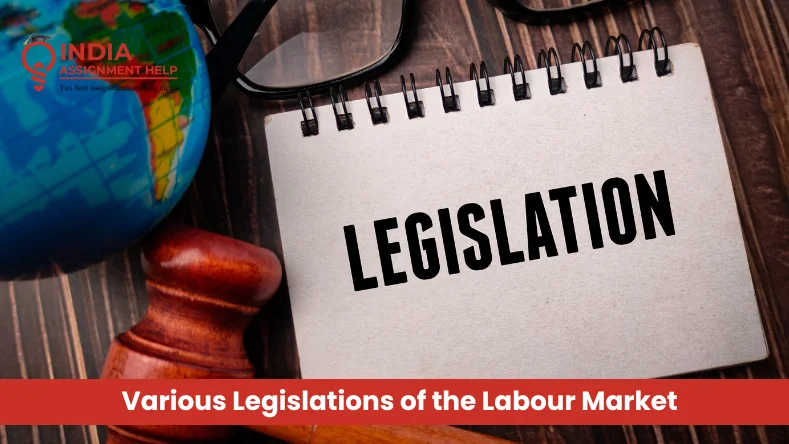Various Legislations of the Labour Market

The study of various legislations in the labour market focuses on understanding the laws and regulations that govern employment relationships. These legislations aim to protect workers' rights, ensure fair treatment, and maintain harmonious employer-employee relations.
Key Components:
- Employment Laws:
- Minimum Wage Laws: Regulations that set the lowest wage rate that employers can legally pay workers.
- Working Hours: Laws governing the maximum hours of work per day or week, overtime pay, and rest periods.
- Employment Contracts: Legislation outlining the terms of employment, including rights, responsibilities, and conditions of work.
- Health and Safety Regulations:
- Occupational Safety and Health Act: Laws ensuring workplace safety, providing guidelines for hazard prevention, and enforcing safety standards.
- Workers' Compensation: Legislation mandating compensation for workers injured or disabled during employment.
- Anti-Discrimination Laws:
- Equal Employment Opportunity Laws: Regulations prohibiting discrimination based on race, gender, age, disability, religion, or other protected characteristics in hiring, promotion, and workplace practices.
- Labour Relations Laws:
- Labour Relations Act: Legislation governing collective bargaining, unionisation rights, strikes, and dispute resolution processes between employers and employees.
- Unfair Dismissal Laws: Regulations protecting employees from unfair termination and outlining procedures for dismissal.
- Social Security Laws:
- Social Security Act: Legislation providing benefits such as retirement pensions, disability insurance, unemployment compensation, and healthcare coverage to workers and their families.
Common Mistakes: Common mistakes include misinterpreting labour laws, failing to comply with health and safety regulations, and overlooking the rights of employees.
Overcoming Obstacles: To overcome these challenges, employers and employees should stay informed about labour laws, seek legal advice when needed, and promote a culture of compliance and fairness in the workplace.
Applications: Understanding labour legislation helps employers comply with legal requirements, protects workers' rights, fosters a safe and respectful workplace environment, and promotes social and economic justice.
Recent Developments: Recent developments in labour legislation include updates to accommodate remote work arrangements, advancements in workplace safety technologies, and amendments to address evolving employment practices like gig economy jobs.
Conclusion: Studying various legislations of the labour market is crucial for ensuring fair and equitable treatment of workers, promoting workplace safety, and fostering productive employment relationships. By understanding these laws, stakeholders can contribute to a harmonious and legally compliant labour market.
Types of Assignments We Can Assist You With:
- Research Papers:
- Comprehensive papers exploring specific labour laws, their impacts, and implications for employers and employees.
- Case Studies:
- Detailed analyses of legal cases involving labour disputes, interpretations of labour laws, and their outcomes.
- Presentations:
- Visual presentations summarizing key labour legislations, their significance, and practical applications in different industries.
- Essays:
- Essays discussing the evolution of labour laws, their role in societal changes, and comparisons across different countries.
- Reports:
- Professional reports assessing compliance with labour regulations, recommendations for improvement, and case studies of successful labour relations practices.
Why Choose the Services of India Assignment Help?
- Expertise and Knowledge:
- Our experts have in-depth knowledge of labour laws across various industries and jurisdictions, ensuring accurate and insightful analysis for your assignments.
- Customized Support:
- We provide personalized assistance tailored to your specific assignment requirements, ensuring thorough research and detailed analysis.
- Timely Delivery:
- We understand the importance of meeting deadlines. Our services ensure prompt delivery of high-quality assignments without compromising on accuracy or depth of analysis.
- Improved Research Capabilities:
- India Assignment Help offer access to credible sources and current legal updates, enhancing the quality and relevance of your assignment content.
Frequently Asked Questions:
Q1. What are some key labour laws that affect employers and employees?
A1. Key laws include minimum wage regulations, occupational health and safety standards, anti-discrimination laws, and provisions for collective bargaining.
Q2. How can knowledge of labour legislations benefit businesses?
A2. It helps businesses comply with legal requirements, avoid penalties, foster a positive work environment, and attract and retain talented employees.
Q3. What are the recent trends in labour legislations globally?
A3. Recent trends include adapting laws to accommodate remote work, addressing issues in the gig economy, and enhancing protections for vulnerable workers.
Q4. How can labour laws contribute to economic development?
A4. By ensuring fair treatment of workers, labour laws promote productivity, social stability, and economic growth by reducing disputes and enhancing workforce morale.
Q5. Where can I find more information on specific labour laws in different countries?
A5. Legal databases, government websites, and academic journals provide comprehensive information on labour laws tailored to specific countries and regions.





